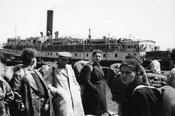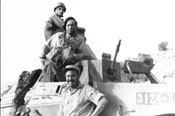Aliyah Bet & Machal Virtual Museum
North American Volunteers In Israel's War of Independence
Remembering Paul Kaye

Paul Kaye was born in the Lower East Side on June 6th, 1927, and unfortunately passed on August 20th, 2021. In 1947, though just 19, he already had WWII naval experience and was tapped to join the Aliyah Bet operation. The following is an excerpt from a Yiddish Book Center interview with Paul. See https://www.yiddishbookcenter.org/collections/oral-histories/interviews/woh-fi-0000172/paul-kaye-2011 for the full interview.
I'm waiting to go to college. I'm working in a record shop, in the Bronx, living with my sister. My mother passed away the same day I was discharged from the Navy -- which was a kick in the head. And I'm waiting to go to school. I'm gonna go to an engineering school. Uncle Sam's gonna pay. And I'm working in the store. And the phone rings and says, "Paul Kaminetzky?" That's my real name, Kaminetzky. I said, "Yes." He says, "Would you like to help your people?" So, I look around the store. "Who is this?" "If you want to help your people, it's very important. We know you're a marine engineer. Be on the corner of Thirty-Ninth Street, southeast corner, Lexington Avenue, Thursday at four o'clock. A man with a black leather jacket will walk by. If he puts a newspaper under his arm, follow him. If he puts it in the wastepaper basket, leave quickly; you're being followed." Click.
You get a call like that, what do you do? I go to my friends, my sister -- I thought they were all a joke -- it was a joke, you know? They thought I was nuts. And I could see on their faces that they didn't know what I was talking about. So, this was real. I go down, I stand on the corner. Four o'clock, a man walks by with a black leather jacket, puts a paper on. I follow him around the corner.
He went on to surreptitiously sail the Hatikvah (Tradewinds) across the Atlantic in order to pick up Holocaust survivors in Europe and bring them to Israel. There were many difficulties with the voyage, but this particular vignette shows that it wouldn't have succeeded if it weren't for Paul and his fluency in Yiddish. The following is another excerpt from the interview:
We're in the Azores to get fuel. They won't give us fuel. The British stopped all -- we had a Panamanian flag. All these ships, they knew who we were, the British, they were looking for us -- they stopped us. And they wouldn't give us fuel. And we're walking on the dock in the Azores. And I'm walking with my buddy, Abi Rosenberg and the chief engineer, Marvin -- Marvin Rosen -- and Chai Braverman, the chief. I was the third assistant. And we're walking on the pier, and I say to him, "Oy vey, what are we gonna do?" My Yiddish -- "Oy vey"? Man walks over to me, he says, "Hosti gezugt 'oy vey' [Did you say 'oy vey']?" I say, "Yeah." He says, "Vos tistu du -- What are you doing here?" He says, "Darf men hobn shemen [We need oil]?" "Shemen" was oil. He says, "Kum mit mir [Come with me]." He walks us to the office, stamps our papers, (claps hands) we load the ship with fuel, and we sail out.
After a stop in Lisbon, where he helped outfit the ship for 1,500 survivors, he sailed to Rome, to help them get onto the ship via rubber boats. The British captured the ship and redirected the passengers and crew to prison a DP (Displaced Person) camp in Cyprus, where Paul had to blend in. From there, he "escaped" by a British prison ship, which sent a number of DPs to the Atlit camp in Israel. During this voyage, Paul and other operatives sabotaged the ship. He was the last one off when the ship exploded. From then on, the Aliyah Bet's own ships were used, which had somewhat better conditions.
Paul was part of the original Shayetet 13, Israel's version of the Navy Seals, despite never having learned to swim. The recruiter for the unit said "We don't swim on the top, we swim on the bottom," which made sense to him. After the war, he returned to the United States. He was an officer of AVI (American Veterans of Israel), the Aliyah Bet and Machal veterans organization that launched this website. In addition, he helped educate the general public about the heroic actions of Americans like him, especially young adults, through numerous speaking engagements. In the 1990's, he was part of several re-enactments of the Exodus, on which kids used to learn about the Exodus before their vacation to Israel, in cruise ships that left from different European cities to go to Israel. We thank Paul for volunteering for the U.S. Navy, service to Holocaust survivors, and going back into harm's way to support the nascent State of Israel's fight for survival.
- Log in to post comments

 Back to News
Back to News


 Contact Us
Contact Us
 In a personal essay, Aliyah Bet and Machal Archives Director Ralph Lowenstein discusses the reasons why so few persons have ever heard of the thousand or so volunteers from North America who played a role in the winning of the War of Independence.
In a personal essay, Aliyah Bet and Machal Archives Director Ralph Lowenstein discusses the reasons why so few persons have ever heard of the thousand or so volunteers from North America who played a role in the winning of the War of Independence.